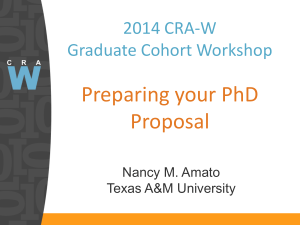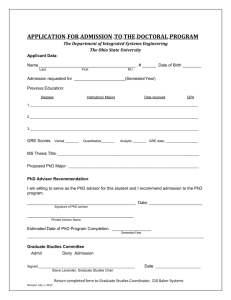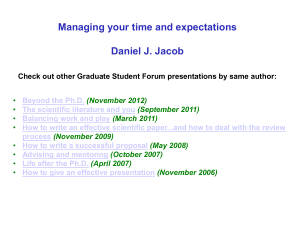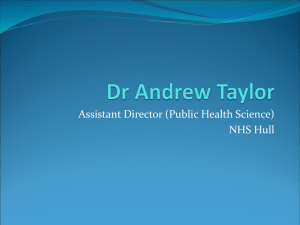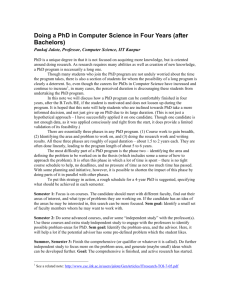Slides - CRA Committee on the Status of Women
advertisement
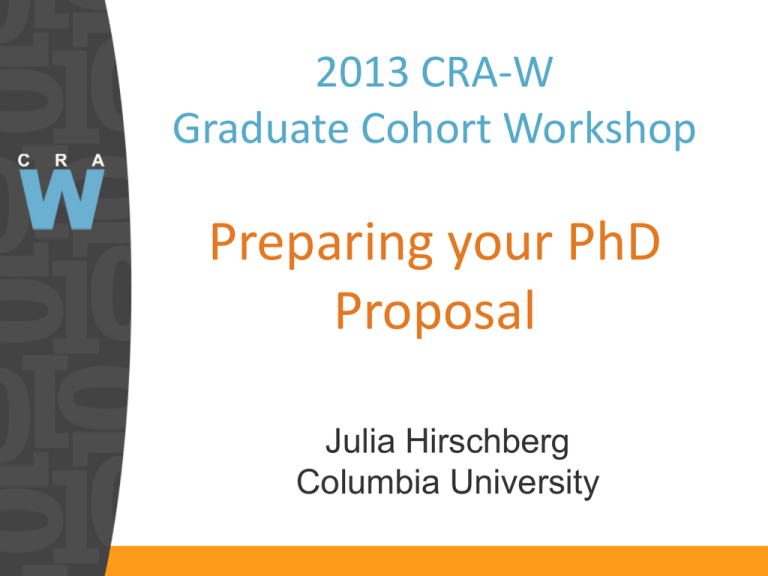
2013 CRA-W Graduate Cohort Workshop Preparing your PhD Proposal Julia Hirschberg Columbia University Who am I? • A computational linguist who works on speech • With a husband and 2 adorable cats • From a small midwestern town and an extended family run by tough women • From Missouri to Manhattan via Florida, Michigan, Mexico, UK, Massachusetts, Philadelphia, NJ • A workaholic who likes baseball, opera and cooking but once had many more hobbies • A parental care provider from long distance An Unplanned Career • University of Michigan, PhD in History • Teaching at Smith and commuting to Philadelphia: 8 years of falling asleep at dinner parties • An encounter with an air conditioner a PhD in CS at Penn • A Sunday hobby a career in speech at Bell Labs • Trying to change the system a department head at Bell and AT&T Labs • A phone call from a friend a Columbia professor Format of this Session • Interactive – – Asking audience for answers to questions – -- Ask questions anytime What is a PhD Proposal really? • A brainstorming and planning process • A succinct writeup of your proposed research goals, strategies, justification, contributions • A good time to get feedback and direction from experts • Sometimes a stressful period of graduate school Why write a PhD Proposal? • Focus your research direction – Writing can clarify your thoughts • Establish contact with committee • Obtain feedback from committee • An important step towards graduation! • Side effect: Proposal writing experience The Proposal Process • Select your committee with your advisor – Get them on board – Get defense date • Write proposal iterating with advisor: the proposal will be a contract with your committee • Give proposal to committee • Prepare presentation of proposal – Practice several times How long should a proposal be? • Check your department rules • Could be: – Columbia: 30pp – no more – Others may be shorter What is the role of the Committee? • Throughout the process … – Guidance and understanding of what to expect – Feedback – Eventually, reference letters • At the proposal – Make sure you know what you’re talking about – Make sure you know the previous literature – Make sure you know the tough issues and have some answers – Make sure your plan is reasonable Selecting the PhD Committee • Know your department rules • Ideally – PhD advisor – Faculty in the topic area to provide useful direction – Faculty outside topic to provide high level feedback – External member – someone in research area who could write a ref letter Proposal Presentation Tips • Attend others’ proposal defenses in your area • Thank committee, introduce yourself and background • Practice presentation many times • Be polite during interruptions with questions • Have someone take notes of questions • Be open to suggestions • Prepare for questions • Don’t be afraid to have no answer for a question. Ask for direction/help on those questions. • Be confident. Don’t look to advisor for answers. Challenges, Frustrations, Misconceptions • “The proposal is just a hurdle. I can just propose ideas off the top of my head now and then figure out what I really want to do later.” – the lazy path • “How can I propose something when I don’t know the details yet?” – the unknown path • “I don’t know how to organize the different parts of the research on the page.” – writer’s block • “I’m not ready yet. I might as well solve the problems and then present them.” – postpone, postpone, postpone…. What does a good Proposal Accomplish? • • • • • • • • The proposal should clearly answer: What is the problem you are studying? Why is it important? What results have you achieved so far and why to they matter? How is this substantially different from prior work? How will you systematically evaluate your work? What do you need to do to complete your work? What is your timeline? When is the best time to write/present a Proposal? • When you’ve completed the rest of your requirements • When you have a clear idea of the problem you want to solve • When you have some preliminary work done to demonstrate promise of your approach • When you have some notion of the major subproblems to be solved • When your advisor recommends What would help before I start writing? • Think about what YOU want to accomplish • Write a succinct thesis statement/hypothesis • Discuss your ideas with others • Present parts of the research at seminars, workshops, PhD workshops, conferences • Think about 3-4 major contributions/papers • Formulate these contributions in writing How do I get started writing? • Look at examples in your department, with same advisor, in your area • Breadth of project proposed – Separation into subprojects – Writing style: problem statement, hypothesis – Organization • Overall outline and flow • Within each proposed project section • How they motivated their topic and foreseen contributions Think about the Audience • Your Committee – Not necessarily all in your general topic area – Not familiar with your specific problem – Not aware of your prior work – Not aware of your skills, infrastructure • Implications – Background: terminology, problem,… – State of the art related to your problem – Convincing motivation for importance – Demonstration of feasibility/promise of success How do you organize a proposal? • Introduction – Problem statement and importance • Background and State of the Art • Proposed Research – Subsections on each research contribution • Evaluation Plans • Research Plan • Summary of your Contributions and Timeline The Introduction • General, high level problem for people outside area to appreciate • Quick overview of what state of the art does not address • Thesis statement – specific open problem and proposed strategy • Brief overview of key insights and why your approach is promising • List of your likely contributions Proposed Research • Overview of project – maybe a figure • Specific project in steps • For each – – Problem – Strategy – Details known now – Plans for remaining challenges – Evaluation plan Evaluation Plans • Experiment Design: – Questions you will ask to judge success of your approach – Independent variables – what is being varied/compared • Eg, your technique versus other techniques – Dependent variables and measures – what is being measured • Effectiveness – precision and recall, f measure • Cost – efficiency – Human subjects? – Methodology • What actions are you going to perform to conduct the experiment? Research Plan • What steps do you plan to take next? • What will you save for post-thesis work? Why? Conclusion • Summary of contributions to the state of the art – intellectual merit • Repetition of broader impact on society Sample Questions at Proposal Defense – Topic too large? too small? doable in the timeframe? Focused? What problems haven’t you foreseen? What happens if your planned experiments fail (backup plans)? – Evaluation (plan, statistics, validity) – Related work missing? – Practicality/scalability – Vision of where this can go… – Certain people have go-to questions • Watch your committee members on other proposal defenses • Especially if your thesis touches on work they have done or know a lot about • Ask your advisor Open Discussion • Questions? • Concerns?
